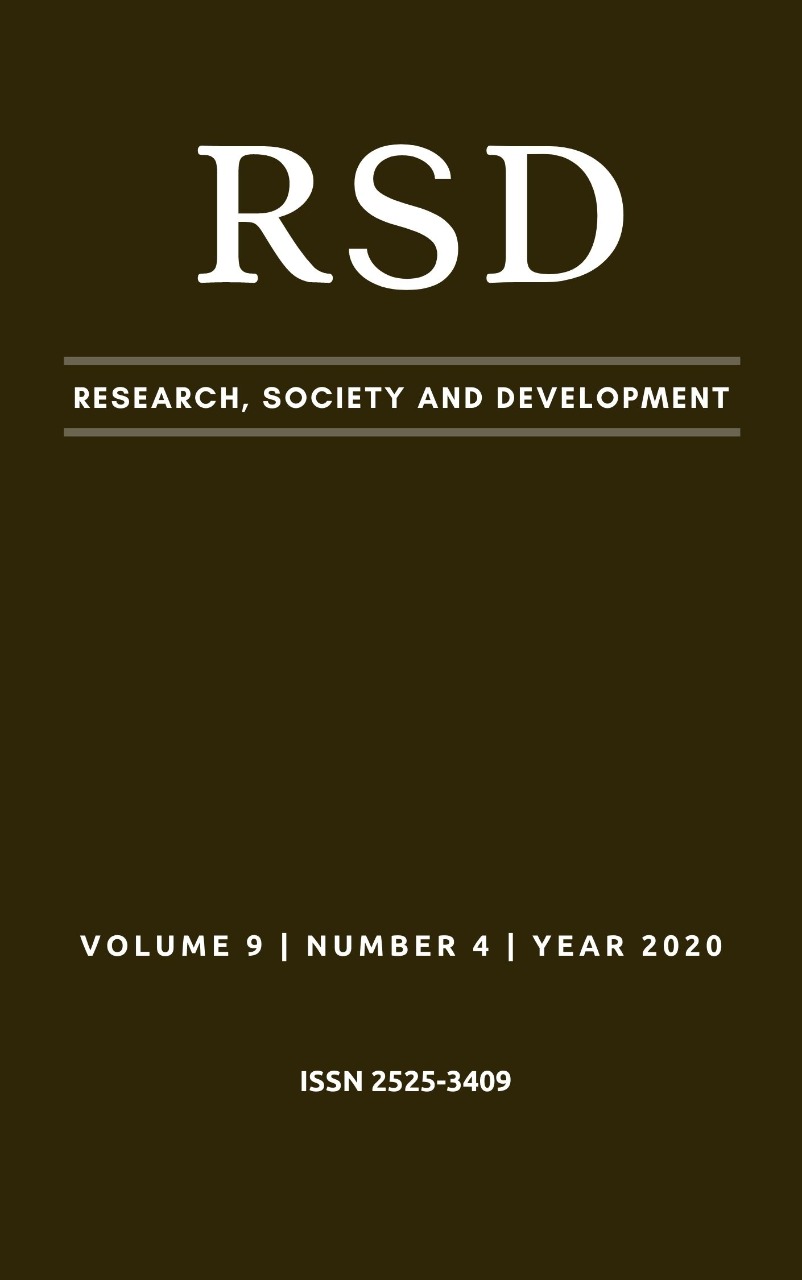Resiliência no processo do cuidado aos pacientes com feridas tumorais malignas: revisão integrativa
DOI:
https://doi.org/10.33448/rsd-v9i4.2922Palavras-chave:
Cuidados Paliativos, Ferimentos e Lesões, Resiliência psicológica.Resumo
A assistência ao paciente com feridas tumorais consiste em tarefa complexa; a resiliência confere adaptabilidade para o manejo nos diversos contextos. O objetivo foi verificar a resiliência no processo do cuidar aos pacientes com feridas tumorais malignas. Trata-se de uma revisão integrativa da literatura realizada nas bases de dados LILACS, MEDLINE, COCHRANE, CINAHL e SCOPUS (2003-2019) com a questão norteadora: Como ocorre a resiliência na dinâmica do cuidado a pacientes com feridas tumorais malignas? Identificaram-se dezessete evidências científicas, sendo elaboradas três categorias de discussão: 1) Resiliência do paciente com ferida tumoral maligna; 2) Resiliência do familiar e/ou cuidador informal no processo do cuidar ao paciente com ferida tumoral maligna; 3) Resiliência da equipe multidisciplinar no processo do cuidar ao paciente com ferida tumoral maligna. Conclui-se que o estigma, a mudança da imagem corporal, a imprevisibilidade e descontrole do odor e do exsudato e a constante evidência de possuir uma doença incurável permite a prática de múltiplas estratégias de enfrentamento por parte dos atores envolvidos no cuidado, culminando em uma melhor vivência. Assim, deve-se considerar os aspectos psicossociais na práxis da enfermagem oncológica no cuidado de pacientes com feridas tumorais malignas.
Referências
Alexander S. J. (2009). Malignant fungating wounds: key symptoms and psychosocial issues. Journal of wound care. 18(8):325-9.
Alexander SJ. (2010). An intense and unforgettable experience: the lived experience of malignant wounds from the perspectives of patients, caregivers and nurses. International Journal of Wound care;7(6):456-65.
Appleton L, Poole H, Wall C.(2018). Being in safe hands: Patients’ perceptions of how cancer services may support psychological well-being. Journal of Advanced Nursing; 74(7), 1531–1543
Chana N, Kennedy P, Chessell Z J. (2015). Nursing staffs’ emotional well-being and caring behaviours. Journal of Clinical Nursing; 24(19-20), 2835–2848.
Di Giacomo D. et al (2016) Breast cancer and psychological resilience among young women. J. Psychopathol: 3, 9001–9905.
Eicher M, Matzka M, Dubey C, White K. (2015). Resilience in adult cancer care: an integrative literature review. Oncol Nurs Forum; 42(1):E3–E16.
Engeli L, Moergeli H, Binder M, Drabe N, Meier C, Buechi S, Dummer R, Jenewein J. (2016). Resilience in patients and spouses faced with malignant melanoma. A qualitative longitudinal study. Eur J Cancer Care (Engl); 25(1):122–131.
EONS Recommendations for Care of Malignant Fungating Wounds. European Oncology Nursing Society (EONS); 2015.
Gibson S, Green J. (2013). Review of patients’ experiences with fungating wounds and associated quality of life. Journal of wound care; 22(5):265-75.
Gitterman A, Knight C. (2016). Promoting resilience through social work practice with groups: Implications for the practice and field curricula. Journal of Social Work Education; 52(4), 448–461.
Gozzo TO, Tahan FP, Andrade M, Nascimento TG, Prado MAS. (2014). Ocorrência e manejo de feridas neoplásicas em mulheres com câncer de mama avançado. Esc Anna Nery 2014; 18(2):270-6.
Haug S H, Danbolt L J, Kvigne K, De Marinis V. (2016). Older people with incurable cancer: existential meaning-making from a life-span perspective. Palliat Support Care; 14(1):20–32.
Horner H. (2017) Resilience. Journal of Pediatric Care; 31(3), 384–390.
Izydorczyk B, Rąba M, Sitnik-Warchulska K.(2018). Resiliency, self-esteem and attitude towards own body in women from early to late adulthood. Health Psychol. Rep;6.
Lazelle-Ali C. (2007). Psychological and physical care of malodorous fungating wounds. British Journal of Nursing; 16(Sup3), S16–S24.
Li Y, Qiao Y, Luan X, Li S, Wang K. (2019). Family resilience and psychological well-being among Chinese breast cancer survivors and their caregivers. European Journal of Cancer Care: 28 (2).
López‐Pina J A., Meseguer-Henarejos A. B., Gascón-Cánovas J. , Navarro-Villalba D. J., Sinclair V.G. , Wallston K. A. (2016). Measurement properties of the brief resilient coping scale in patients with systemic lupus erythematosus using Rasch analysis. Health and Quality of Life Outcomes;14 (128).
Palacio C, Krikorian A., Limonero J. T. (2017) The influence of psychological factors on the burden of caregivers of patients with advanced cancer: Resiliency and caregiver burden. Palliative & Supportive Care; 16(03), 269–277.
Pereira, A.S. et al. (2018). Metodologia da pesquisa científica. [e-book]. Santa Maria: UAB/NTE/UFSM. Disponível em: https://repositorio.ufsm.br/bitstream/handle/1/15824/Lic_Computacao_Metodologia-Pesquisa-Cientifica.pdf?sequence=1
Piggin C. (2003). Malodorous fungating wounds: uncertain concepts underlying the management of social isolation. International Journal of Palliative nursing 2003; 9(5):216-221.
Probst S, Arber A, Faithfull S. (2013). Malignant fungating wounds: the meaning of living in an unbounded body. European Journal of Oncology Nursing; 17:38-45.
Probst S, Arber A, Trojan A, Faithfull S. (2012). Caring for a loved one with a malignant fungating wound. Support Care Cancer; 20(12):3065–70.
Sołtys M, Woźniewicz A. (2015). Resiliency and subjective health assessment. Moderating role of selected psychosocial variables. Health Psychol. Rep. 2015;4:137–145.
Tilley C, Lipson J, Ramos M. (2016). Palliative wound care for malignant fungating wounds: holistic considerations at enf-of-life. Nurs Clin N Am; 51(3):513-31
Waugh C E K, Ernestn H. (2015). A resilience framework for promoting stable remission from depression. Clinical Psychology Review. 2015; 4(1).:49-60.
Downloads
Publicado
Edição
Seção
Licença
Autores que publicam nesta revista concordam com os seguintes termos:
1) Autores mantém os direitos autorais e concedem à revista o direito de primeira publicação, com o trabalho simultaneamente licenciado sob a Licença Creative Commons Attribution que permite o compartilhamento do trabalho com reconhecimento da autoria e publicação inicial nesta revista.
2) Autores têm autorização para assumir contratos adicionais separadamente, para distribuição não-exclusiva da versão do trabalho publicada nesta revista (ex.: publicar em repositório institucional ou como capítulo de livro), com reconhecimento de autoria e publicação inicial nesta revista.
3) Autores têm permissão e são estimulados a publicar e distribuir seu trabalho online (ex.: em repositórios institucionais ou na sua página pessoal) a qualquer ponto antes ou durante o processo editorial, já que isso pode gerar alterações produtivas, bem como aumentar o impacto e a citação do trabalho publicado.


